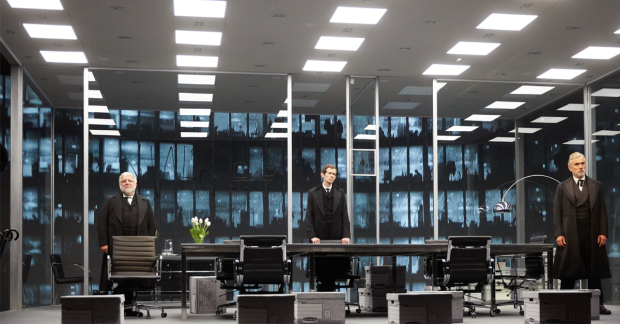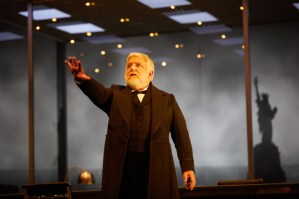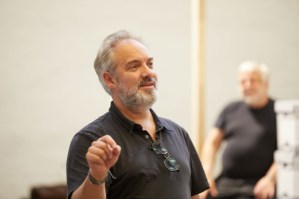Review: The Lehman Trilogy (National Theatre)
Sam Mendes directs this stage adaptation of Stefano Massini’s novel

© Mark Douet
There's a pleasing symmetry to this magical piece of story-telling. Across three hours, and three acts, three magnificent actors conjure the story of the three Lehman brothers, the fate of whose company came to symbolise something about the state of America and of capitalism.
Inside those trilogies, there are other threes: three nightmares, three courtships, three wives, three generations, three frock coats, all bound in the great overall arc of Ben Power's poetic adaptation of Stefano Massini's sprawling novel, which combines the epic and the miniature, a world in a grain of sand, or at least, a spinning cube of a set.
It begins at the end, in 2008, when the investment bank thought to be too big to be allowed to fail, has collapsed, the largest casualty of the US subprime mortgage housing crisis. In its wake, it triggered a world financial crisis. Then, as Simon Russell Beale walks onto Es Devlin's glass-cube of a set, full of modern furniture and packed cardboard boxes, Luke Halls' projections of the skyscrapers of modern New York fade, and are replaced with water, and a looming Statue of Liberty. Henry Lehman has arrived by boat after a 45-day crossing from Rimpar, Bavaria and is about to make his way in the "magical music box called America."
The play charts the rise of the family from a fabric store in Montgomery, Alabama, through the arrival of two more brothers – combustible Emmanuel (Ben Miles) and quiet Mayer (Adam Godley) whose skin is as "smooth as a just-peeled potato" and who plays the role of the conciliator between Henry (the head) and Emmanuel (the arm) as they build their business into a Wall Street bank. Accompanied by constant piano music, played just offstage by music director Candida Caldicot, the style is less that of a drama and more a theatrical narrative; the actors describe and explain what they are doing and slip in and out of many characters.
These early acts, a business-world and honest version of Coppola's early Godfather scenes, are a profound pleasure, directed by Sam Mendes with the delicacy and control of a maestro. Everything surrounding the actors is in black and white, a constantly shifting projected landscape of cotton fields, warehouses, and New York growing up from nothing. Occasional flashes of colour illuminate Jon Clark's lighting – when we reach the Wall Street crash of 1929, the overhead strip lights flash like yellow gunfire. The men dream in vivid colour, fearing failure and death.
But the vividness of the entire production springs from the depth and subtlety of the acting. These are towering performances, flecked with touches of performing genius. With a lift of the collar, or an inclination of the head, the men become women, children, plantation owners, city tycoons. There are wonderful set pieces. Beale in particular, with his natural exuberance, is glorious as a piano-playing blushing bride and her tiny father (sitting on a pile of boxes); Godley becomes another bride, switching expression rapidly (annoyed, amused, curious) over months of courtship; Miles is a child, sitting at his father's knee, and one arguing fiercely with a rabbi. He shifts shape less often than the other two, but like them, he brings real depth to his portrayal of generations of the Lehman family, subtly delineating between the men by a shift of stance, the addition of a pair of glasses, the adoption of a gesture.
If I have a criticism, it is that the very control of the story-telling undercuts its emotional sweep. Even when tragedy strikes, the tone is even. And the ending – the final shift from a bank that invests in people and real things to a trading house which deals only in the movement of money – though long signalled in the script, is ultimately rushed. The arrival of the new characters who bring about the House of Lehman's fall is cleverly structured – we first meet them as children as Wall Street crashes – but hard to grasp as the narrative suddenly accelerates.
But what I love is the way that the script and the performances allow, even in the headlong hurtle of an epic, small, light touches of meaning. We see, for example, the way that religion recedes from the people's lives in the repeated scenes where the family sit shiva for their relations. A week of respect for Henry becomes three minutes of silence for his great-nephew Robert. The moment towards the end, when the three original brothers walk into their tiny shop, touching the doorpost in reverence, is a reminder of the values that once underlaid the making and selling of things – and that were lost as capitalism found its present, ugly form.


















